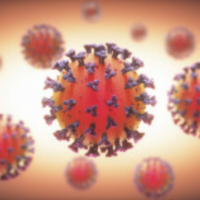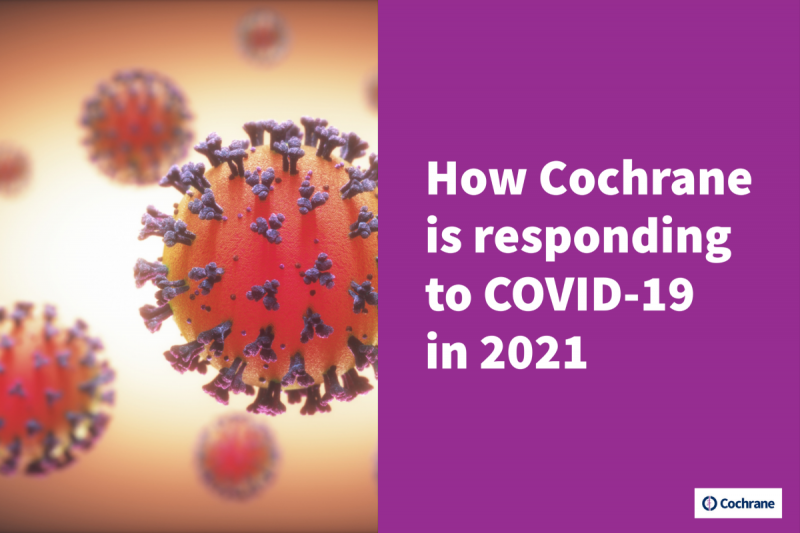
In 2020, Cochrane’s editorial response to COVID-19 pandemic brought together collaborations across our global organization to publish reviews addressing stakeholder needs as they emerged. Large, highly organized review teams worked together to produce evidence addressing priorities in treatment, prevention, and diagnostics. In 2021, Cochrane continues to produce new and updated reviews in response to the pandemic.
In this interview with Deputy Editor in Chief Toby Lasserson and Executive Editor of Cochrane's Central Editorial Service Helen Wakeford, we ask them about Cochrane’s editorial approach to COVID-19 in 2021. The interview supports their paper, which sets out how Cochrane will respond to COVID-19 going forward and the priorities which inform this response.

What have you set out to explain in this paper?
Helen: "The scope of reviews that Cochrane could potentially publish on COVID-19 is enormous. In addition, most review questions have a rapidly evolving evidence base that demands frequent updating of the review in order for it to remain useful to readers. So we needed to prioritise key topics on which to focus our resources. This paper sets out those priorities, and the rationale for why we have identified them as such. In 2021 and beyond, we will consider future submissions against these priorities. We will also be able to identify evidence synthesis gaps within our priority areas and actively commission reviews.
We are aware that the COVID-19 pandemic is a rapidly evolving situation and we want to retain flexibility to respond to emerging priorities. In the report, we have explained that will stay tuned into organisations such as COVID-END who ‘horizon scan’ for emerging areas of need. We will also track the production of other high quality evidence syntheses to make sure that we are avoiding research waste."
What was 2020 like in terms of pace and coverage?
Helen: "2020 – at least, from March onwards - was extremely fast-paced! Authors from Cochrane Centres, CRGs and those who were new to Cochrane, worked around the clock to address urgent evidence synthesis questions. We considered producing preprints of these reviews, but instead developed an ultra-rapid editorial process of between 7-21 days in order to retain both speed and editorial rigour, and stay true to Cochrane’s reputation for ‘trusted evidence’. This meant close collaboration between the Central Editorial Service team and many colleagues across Cochrane, involving long days and late nights at work.
Cochrane’s coverage of COVID-19 reviews in 2020 was broad and responded to the needs of guideline developers. Our reviews examined the effectiveness of public health measures such as quarantine, PPE, ash for hand washing, universal screening, travel control measures and digital contact tracing in controlling COVID-19. We also published a qualitative review of barriers and facilitators of healthcare workers’ adherence to infection and prevention control, and scoping reviews looking at school measures to control COVID-19 and ICU care bundles for improving patient outcomes.
Reviews of diagnostic test accuracy were another major feature of our COVID-19 response, examining the diagnostic accuracy of antibody tests, signs and symptoms, thoracic imaging, routine laboratory testsand rapid, point of care tests.
As high-quality data from trials of COVID-19-specific therapeutics were slower to emerge, so were reviews of these interventions. We published reviews of convalescent plasma and hyperimmune immunoglobulin, and anticoagulants. The mental health of particularly impacted populations was also addressed by our reviews Interventions to support the resilience and mental health of frontline health and social care professionals during a disease outbreak, epidemic or pandemic and following de-escalation and Video calls for reducing social isolation and loneliness in older people.
Several of these reviews were updated multiple times during the course of the year (e.g. quarantine, convalescent plasma, thoracic imaging).
The above reviews were managed centrally, but others were published via Cochrane Review Groups, including a suite of reviews on mouth washes and sprays for preventing COVID infection, oxygen targets during ventilation and an update of a review of physical interventions to reduce the spread of respiratory viruses.
We were very much, and quite rightly in my view, in ‘response mode’ in 2020, attempting to address the urgent needs of our stakeholders. But now we can take stock, look at our emerging priorities and plan for the future."
What key priorities are set out in the paper?
Toby: "We identified important public health intervention and diagnostic accuracy reviews last year, so keeping those up to date is important. We are also looking to expand coverage in three areas relating to vaccination and immunity, generic medicines, and mental health consequences of the pandemic.
We would also do well to look back as well as forward. In the years after the influenza pandemic of 1918, there was an increase in neurological conditions thought to be related to the influenza virus. In a similar vein we can expect long term health consequences of COVID 19 to emerge years from now. Priorities will continue to shift but the need for evidence is fixed. To ensure that the evidence we can provide is relevant, we need to be flexible and move with what we know is happening.
Varied as these topic areas are, they each serve to highlight how misinformation and inequity have exacerbated and lengthened the course of the global pandemic. Addressing them will require no shortage of effort or evidence. To be relevant to the challenges ahead, our response to COVID 19 is not just about what we cover, but how we cover it. Where possible we want to see our reviews adopt an equity perspective to ensure that we can inform health and policy decisions."
How will these priority areas shape what Cochrane publishes?
Toby: "They will keep us on track to ensure our output is focused and relevant to what we know are the most important considerations for health systems globally. Since the start of 2020 I think we’ve got a better sense of what we need to stay on top of, but we’ve also seen how quickly gaps in coverage can emerge as new interventions and diagnostic tests are promoted and used. The need for effective treatments and tests has stressed efforts to evaluate these things properly, so balancing speed and rigour has become ever more important for us.
The collaborative work between all parts of Cochrane in response to COVID 19 needs to continue for us to continue to meet the information needs of our users. Working closely with CRGs as we have done in responding to COVID 19 so far shows how effective we are as a team in Cochrane. For the collaboration to truly pay off, we also need to reduce unnecessary duplication of effort, and so we recommended surveillance of what other review producers are doing."
If you look back in five-years-time, what will you most proud and pleased to have achieved in response to the pandemic?
Toby: "I think seeing the reviews coming through to publication having worked with Helen to put together an editorial team and process so quickly. Something profound was happening as so many people from across the community found a connection with us and with each other through this process. To know that all of this was happening against a backdrop of great turmoil and isolation from colleagues, friends and family was humbling."
Helen: "I feel proud of the number of reviews published and the speed at which this was achieved, despite such stressful circumstances. The Central Editorial Team have managed the editorial process for 29 COVID-19 reviews and updates to date, and this shows no sign of slowing down. Seeing the number of times these reviews have been shared and cited makes me feel that we may have made a real contribution to evidence-based decision making during the pandemic.
What makes me most pleased is that when we could have felt at our most isolated, we came together as a global team and supported one another. I feel much closer to my colleagues after the past year and consider them friends."
Over a 12-week period from March to August 2020, we drew together reflections about what external stakeholders thought about Cochrane’s initial response to COVID-19 - you can read the External Stakeholder Evaluation of Cochrane's COVID-19 response here. If you would like more information on the findings, please contact Jo Anthony janthony@cochrane.org or Karen Head Khead@cochrane.org from Cochrane's Knowledge Translation Department.
Originally posted on Cochrane.org.




